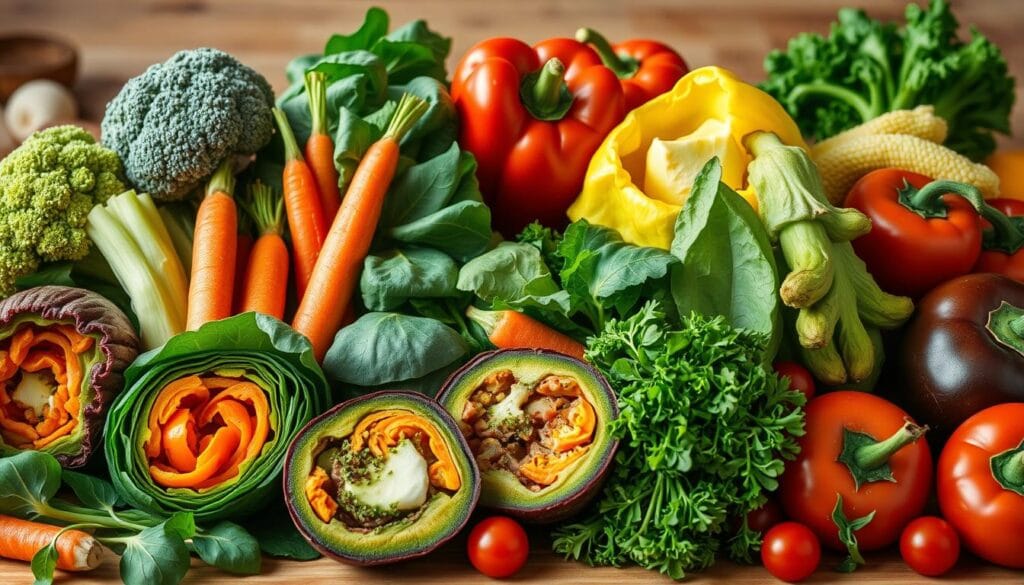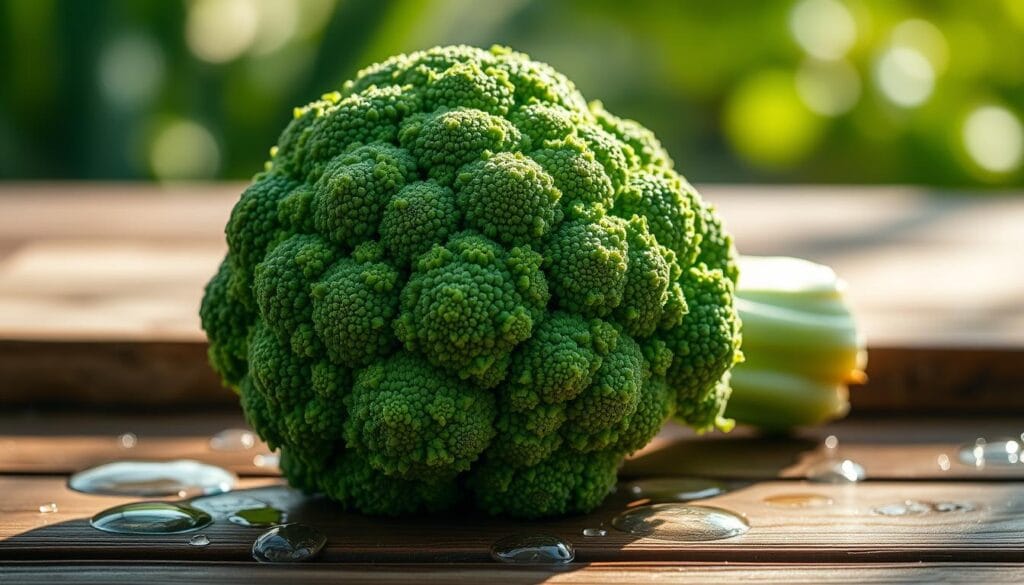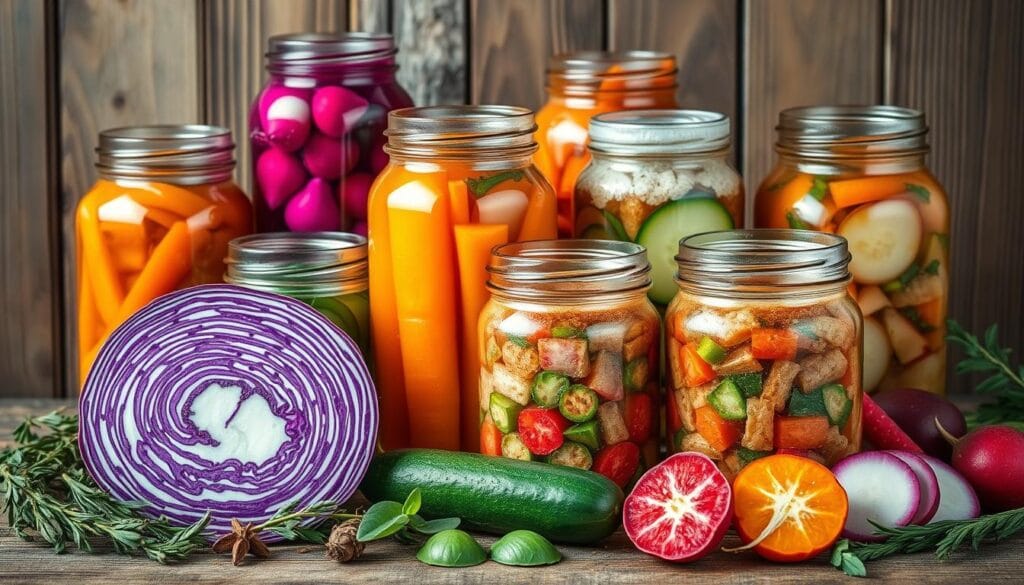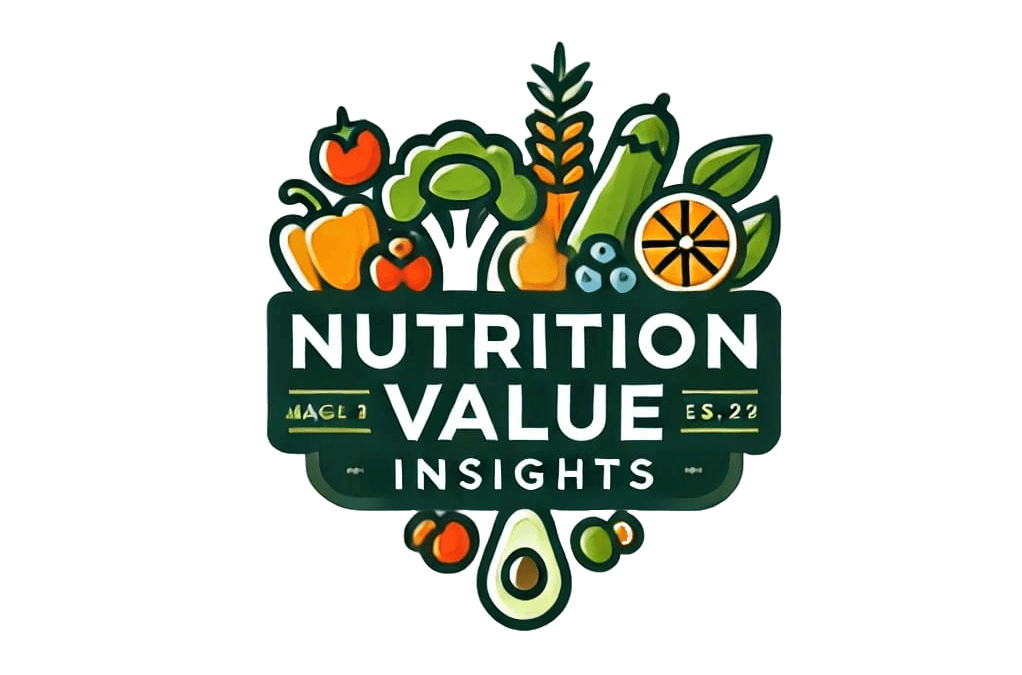Nutritional Value of Everyday Vegetables You Should Eat More Often
Vegetables are packed with nutrients that boost your health. They help with digestion, lower heart disease risk, and manage blood sugar. Eating a variety of nutritional value of vegetables, healthy vegetables to eat daily can change your life. But, some veggies are better than others because of their high high-nutrient vegetables and special health benefits.

Table of Contents
Importance Nutritional Value of Everyday Vegetables
Vegetables are packed with nutrients, but each type has its own special benefits. Eating a variety of vegetables helps you get all the good stuff your body needs.
Nutrients Found in Different Vegetable Groups
Dark green veggies like spinach and kale are full of vitamins K, A, and C, plus iron. Carrots and sweet potatoes, on the other hand, are rich in beta-carotene, which turns into vitamin A in our bodies. Beans, peas, and lentils are great for fiber and protein. Potatoes and corn offer complex carbs, while broccoli and mushrooms are low in calories and carbs.
Benefits of a Plant-Based Diet Rich in Vegetables
Eating mostly plants, including veggies, fruits, and whole grains, can really help prevent diseases. Vegetables are low in calories but high in fiber, vitamins, and antioxidants. They’re key to a healthy diet. Adding more veggies to your meals can boost your digestion, lower blood pressure, and help with weight loss. They even protect your cells from damage, slowing down aging.
| Vegetable | Calories | Nutrients |
|---|---|---|
| Apple | 72 | Vitamin C, fiber |
| Banana | 105 | Potassium, vitamin B6 |
| Green Beans | 44 | Vitamin C, fiber |
| Blueberries | 83 | Vitamin C, fiber, antioxidants |
| Grapes | 100 | Vitamin C, antioxidants |
| Hummus | 46 | Protein, fiber |
Consuming a diverse array of vegetables ensures you get the full spectrum of beneficial nutrients.
Spinach: A Nutrient Powerhouse
Spinach is a top choice for those looking for a nutrient-rich food. It’s full of vitamins and minerals. Just one cup of raw spinach gives you all the vitamin K you need for the day. This vitamin is key for strong bones and blood clotting.
Spinach also has lots of vitamins A and C. Vitamin A helps your eyes and immune system. Vitamin C fights off cell damage. Plus, it has iron for healthy blood and energy.
Rich in Vitamins K, A, C, and Iron
Spinach is a nutritional powerhouse. It’s packed with vitamins and minerals. It has a lot of vitamin K, A, and C, and iron too.
Vitamin A is good for your eyes and immune system. Vitamin C protects your cells. Iron helps make red blood cells and gives you energy.
Spinach’s Role in Bone Health and Blood Clotting
Spinach is great for your bones because of its vitamin K. Vitamin K helps your body use calcium for strong bones. It also helps your blood clot properly to prevent too much bleeding.
If you take blood thinners, eating spinach regularly is important. It helps avoid bad interactions with your medication.
| Nutrient | Amount per 1 cup raw | Percent Daily Value |
|---|---|---|
| Vitamin K | 472 mcg | 590% |
| Vitamin A | 5,707 IU | 114% |
| Vitamin C | 27.8 mg | 46% |
| Iron | 0.8 mg | 5% |
“Spinach is a true superfood, packed with essential vitamins and minerals that support overall health and wellness.”
Kale: A Superfood Leafy Green
Kale is a superfood that’s great for your diet. One cup of raw kale is full of vitamins A, C, and K. Vitamin A helps your eyes and immune system, while vitamin C fights infections and damage.
Kale also has lots of vitamin K, which is good for bones and blood. Eating kale can even help your cholesterol levels. It’s full of nutrients that are good for your health.
Packed with Vitamins A, C, and K
Cooked kale is full of vitamins. It has 485 milligrams of potassium, which is good for your heart. Kale also has 5.72 grams of fiber, which helps with digestion and may prevent diabetes.
The antioxidants in kale fight off free radicals. This may lower the risk of cell damage and diseases like cancer. Kale also has a lot of vitamin K, which is great for bones.
Kale is also rich in vitamin C, with 91.1 milligrams per cup. This vitamin is important for your skin, hair, and bones. Kale also has nutrients that are good for your eyes, helping prevent age-related macular degeneration.
Kale is not just full of vitamins. It also has minerals like calcium and iron. Plus, it has folate, which is good for your overall health.
Broccoli: A Cancer-Fighting Cruciferous Veggie
Broccoli belongs to the cruciferous family, which also includes cabbage, kale, and cauliflower. It’s packed with vitamins K and C. Just one cup of cooked broccoli gives you more than twice the daily vitamin C you need.
The National Cancer Institute says broccoli and similar veggies may fight cancer. They contain indoles and isothiocyanates. These help protect cells and fight off harmful agents.
Broccoli sprouts have a lot of sulforaphane, up to 400 times more than other veggies. This compound is good for your health. It can:
- Lower bad cholesterol and increase good cholesterol.
- Help people with type 2 diabetes by improving heart health.
- Boost antioxidants and reduce inflammation in type 2 diabetes patients.
- Lower harmful inflammation markers in humans.
Adding mustard seed to broccoli can make sulforaphane even more effective. Drinking a broccoli sprout beverage can also cut down on harmful compounds like benzene.
But, the FDA warns some groups to avoid raw broccoli sprouts. This includes kids, the elderly, pregnant women, and those with weak immune systems. They might get sick from harmful pathogens.

Eating broccoli and other cruciferous veggies can boost your health. It might even lower cancer risk. Knowing what makes broccoli special can help you make better food choices for your health.
Nutritional Value of Everyday Vegetables
While spinach, kale, and broccoli are known for their nutrients, don’t forget about everyday veggies. Peas, for instance, are full of plant-based protein, fiber, and vitamins. Sweet potatoes are packed with beta-carotene, vitamins A and C, and fiber. Carrots boost your vision with vitamin A and fight cancer with antioxidants.
Adding a variety of veggies to your diet is key. This way, you get all the nutrients your body needs. It’s not just about the fancy greens; common veggies are just as important.
Vegetables fall into five groups: dark greens, reds and oranges, beans and peas, starchy ones, and others. Starchy veggies like potatoes have more calories and carbs. Non-starchy ones, like asparagus, have fewer calories and carbs.
Vegetables are full of vitamins and minerals like calcium, fiber, iron, and vitamins A and C. The USDA suggests eating 1 to 4 cups of veggies daily, based on age and gender. Cooking methods like stir-frying and steaming keep more nutrients than frying or boiling.
Eating too few veggies can lead to heart disease and obesity. By adding a variety of veggies to your meals, you meet your body’s nutritional needs.
Sweet Potatoes: A Nutritious Root Vegetable
Sweet potatoes are packed with vitamins and minerals. One medium sweet potato gives you over 100% of the daily vitamin A you need. This vitamin is key for your eyes, immune system, and skin.
They also have a lot of fiber, about 4 grams per medium potato. This fiber is good for your digestion and can help control blood sugar levels, especially for people with diabetes.
High in Vitamin A and Fiber
Sweet potatoes don’t raise blood sugar levels quickly because of their low glycemic index. This makes them great for people with diabetes or those watching their blood sugar. A cup of baked sweet potato with skin has 213% of Vitamin A and 44% of Vitamin C you need daily.
Potential Benefits for Diabetes Management
The antioxidants and fiber in sweet potatoes might also improve insulin sensitivity. This could lower the risk of diabetes complications. However, more studies are needed to confirm these benefits.
Sweet potatoes are also rich in manganese, copper, and pantothenic acid. They have Vitamin B6, potassium, and niacin too. These nutrients are important for your health.
| Nutrient | Amount in 1 cup of baked sweet potato with skin | % Daily Value |
|---|---|---|
| Vitamin A | 21,907 IU | 213% |
| Vitamin C | 26.4 mg | 44% |
| Manganese | 0.9 mg | 43% |
| Copper | 0.3 mg | 36% |
| Pantothenic Acid | 2.0 mg | 35% |
| Vitamin B6 | 0.4 mg | 34% |
| Potassium | 855 mg | 20% |
| Niacin | 1.1 mg | 19% |
Carrots: A Vision-Boosting Veggie
Carrots are packed with vitamin A, thanks to beta-carotene. Eating just one cup of raw carrots gives you over 100% of your daily vitamin A. This vitamin is key for good vision, especially at night.
Carrots also have antioxidants that fight cancer. Studies show eating more carrots can lower the risk of breast and lung cancer. This is because of the antioxidants and other compounds in carrots.
Rich in Beta-Carotene and Antioxidants
Carrots have more than just beta-carotene. They also have other compounds that fight cancer. A study found eating 2-4 carrots a week can lower colorectal cancer risk by 17%.
The antioxidants in carrots help prevent cell damage and stop tumors from growing. More research is needed to understand how they fight cancer.
Potential Cancer-Fighting Properties
Carrots are mostly water, with 86% to 95% of their content being water. They have about 10% carbs. Two small-to-medium raw carrots have 41 calories, 89% water, and 9g carbs.
Carrots are mostly water and carbs. They have starch and sugars like sucrose and glucose. Their glycemic index is between 30 and 85, with raw carrots being lower.
Carrots are full of vitamins and minerals like biotin, potassium, and vitamins A, K1, and B6. They also have pectin, a soluble fiber that helps with blood sugar and gut health. Carotenoids in carrots are antioxidants that fight heart disease and cancer.
Carotenoids in carrots may protect against prostate, colon, and stomach cancers. They can also lower blood cholesterol. Carrots are low in calories, which helps with weight loss.
Carrots are good for your eyes because of vitamin A. They can prevent night blindness and age-related macular degeneration.
Fermented Vegetables: A Probiotic Powerhouse
Fermented veggies like sauerkraut, pickles, and kimchi offer more than just nutrition. They also bring the health perks of probiotics. Probiotics are good bacteria that boost gut health and digestion. The National Center for Complementary and Integrative Health says they can ease irritable bowel syndrome and stop diarrhea from infections or antibiotics.
Adding fermented veggies to your meals is a smart way to keep your gut healthy. This supports your overall digestive health.
Improved Gut Health and Digestion
The fermentation process in these veggies introduces lots of probiotics. These can greatly benefit your digestive system. For instance, sauerkraut is full of lactobacillus bacteria, which can help with irritable bowel syndrome.
Kimchi, a Korean dish, is packed with fiber, vitamins, and beneficial bacteria. It also has minerals and other compounds that help keep your microbiome balanced.
Kefir, a fermented dairy, has 12 probiotic strains and lots of nutrients like calcium and vitamin D. It can also help control blood sugar, which is good for people with type 2 diabetes.
Fermented pickles are another great probiotic source for gut health. Kombucha, a fermented tea, has compounds like polyphenols and B vitamins. It’s also rich in vitamin C and minerals. Research shows kombucha can fight inflammation, act as an antioxidant, and even help with diabetes.

Fermentation time varies from a few days to weeks, depending on the food. It’s key to remember not all fermented foods are probiotic. High heat can kill the live microorganisms, including probiotics. So, choose fermented veggies that haven’t been pasteurized or heat-treated to get the most health benefits.
Tomatoes: A Versatile Fruit-Vegetable
Tomatoes are technically fruits but often used like vegetables in cooking. They are packed with lycopene, a powerful antioxidant that makes them red. This antioxidant may help prevent prostate cancer and has cancer-fighting properties.
Cooked tomatoes are especially good for you because they have more bioavailable lycopene. This makes them a great choice for a healthy, balanced diet.
Lycopene and Its Potential Cancer-Fighting Properties
Tomatoes also have lutein and zeaxanthin, which are good for your eyes. Studies show that eating foods rich in these carotenoids can lower the risk of age-related macular degeneration. This is a big problem for older adults.
Adding tomatoes to your meals can help keep your eyes healthy. It’s a simple way to fight age-related vision problems.
Lutein and Zeaxanthin for Eye Health
Tomatoes have 32.4 calories per cup and are full of nutrients. They are rich in potassium, vitamin C, and lycopene. They also have beta carotene, lutein, and zeaxanthin, which are great for your eyes.
Even though they are fruits, tomatoes are often used like vegetables. This makes them a versatile and healthy addition to your meals.
FAQ
What are the health benefits of eating a variety of vegetables?
Vegetables are full of vitamins, minerals, fiber, and antioxidants. They offer many health benefits. Eating different vegetables can improve your health and well-being.
They support your digestive system, lower blood pressure, and reduce heart disease risk. They also help manage blood sugar, aid in weight control, and slow aging.
Which vegetables are considered the most nutrient-dense?
All vegetables are nutritious, but some stand out. Dark green veggies like spinach and kale are rich in vitamins K, A, and C, and iron.
Red and orange veggies, such as carrots and sweet potatoes, are packed with beta-carotene. This antioxidant converts to vitamin A in the body. Beans, peas, and lentils are great for fiber and plant-based protein.
What are the benefits of following a predominantly plant-based diet rich in vegetables?
Eating mostly plants can lower the risk of heart disease, type 2 diabetes, and some cancers. Vegetables are low in calories but high in nutrients. They support digestive health, lower blood pressure, and manage blood sugar.
They also aid in weight loss and slow aging by protecting cells from damage.
What makes spinach a nutritional powerhouse?
Spinach is very nutritious, offering a lot of vitamins and minerals. One cup of raw spinach gives you all the vitamin K you need for the day. It’s also rich in vitamins A and C, and iron.
Vitamin A is good for your eyes and immune system. Vitamin C is a strong antioxidant that protects cells.
How does kale’s nutrient profile benefit health?
Kale is another super-healthy leafy green. One cup of raw kale has lots of vitamins A, C, and K. Vitamin A is key for eye health and immune function.
Vitamin C fights infections and protects cells. Kale’s vitamin K supports bone health and blood clotting, like spinach.
What makes broccoli a cancer-fighting vegetable?
Broccoli is part of the cruciferous family, which includes kale and cauliflower. It’s full of vitamins K and C, with over twice the daily vitamin C in one cup. Broccoli’s compounds may stop certain cancers, like bladder, breast, liver, and stomach cancer.
What are the nutritional benefits of everyday vegetables?
Everyday veggies like peas, sweet potatoes, and carrots are also very nutritious. Peas are a good source of protein and fiber. Sweet potatoes are rich in vitamins A and C, and fiber.
Carrots are full of vitamin A and antioxidants that may fight cancer.
What are the health benefits of sweet potatoes?
Sweet potatoes are full of vitamins and minerals. One medium sweet potato has over 100% of your daily vitamin A. This is great for your eyes, immune system, and skin.
Sweet potatoes also have a lot of fiber, which is good for digestion and blood sugar control.
How do carrots benefit vision and overall health?
Carrots are known for their vitamin A, mainly from beta-carotene. One cup of raw carrots gives you over 100% of your daily vitamin A. This is important for your vision, especially at night.
Carrots also have antioxidants that may protect against breast and lung cancer.
What are the benefits of fermented vegetables?
Fermented veggies like sauerkraut and kimchi are full of nutrients and probiotics. Probiotics are good for your gut health. Adding fermented veggies to your diet can help your digestion and overall gut health.
What are the health benefits of tomatoes?
Tomatoes are rich in lycopene, an antioxidant that gives them their red color. Lycopene may help prevent prostate cancer. Tomatoes also have beta-carotene, which may fight cancer.
Tomatoes have antioxidants like lutein and zeaxanthin that protect your vision. Eating tomatoes can help your eye health and prevent age-related vision problems.
DID OUR INFORMATION HELP YOU ?
There are no reviews yet. Be the first one to write one.

